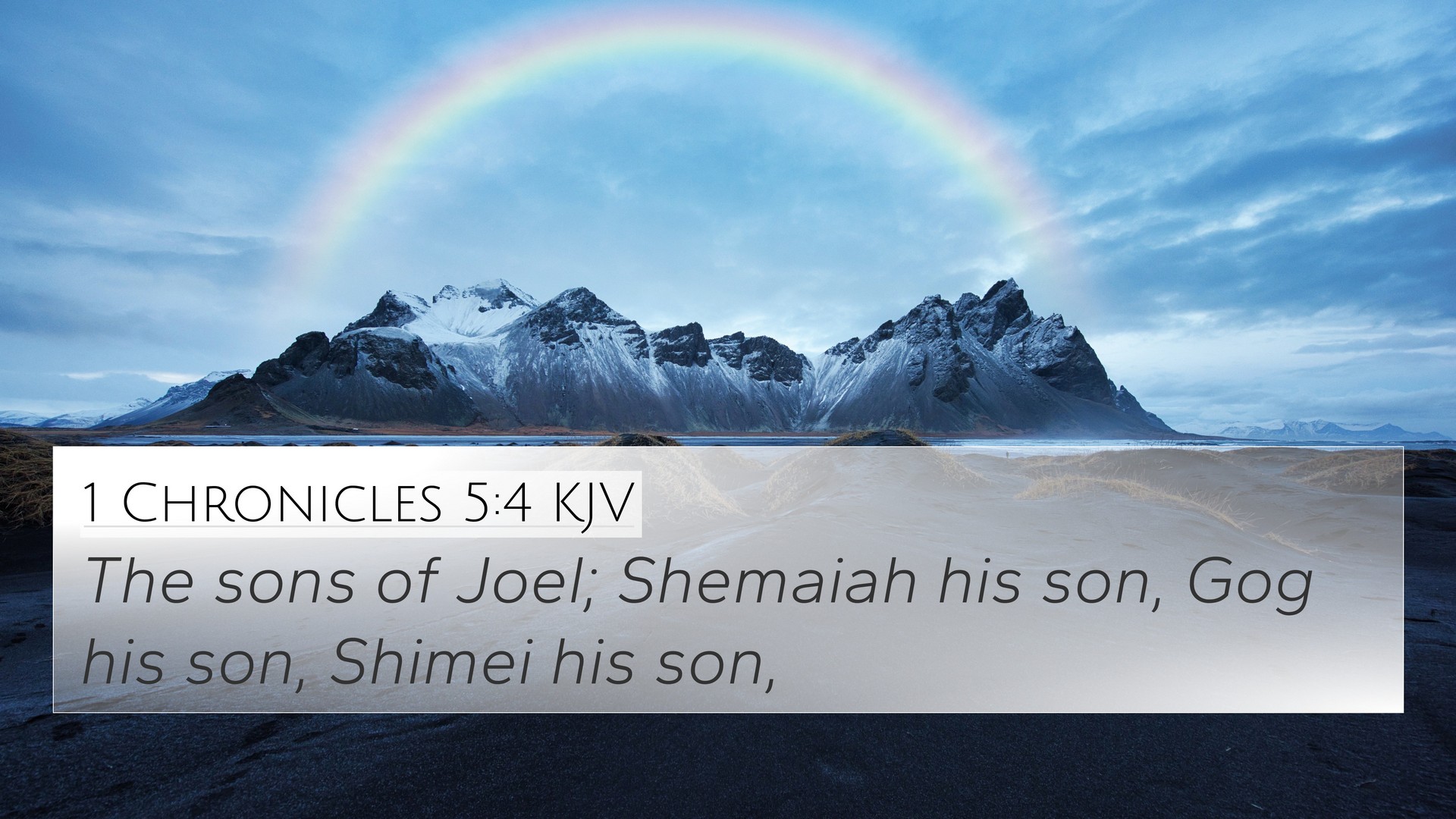Bible Verse Meaning Summary for 1 Chronicles 5:4
Verse: 1 Chronicles 5:4 states: "The sons of Joel were Shemaiah his son, Gog his son, Shimei his son." This verse lists the descendants of Joel, a leader of the tribe of Reuben, highlighting the lineage and significance of familial connections in ancient Israel.
Understanding the Verse
This verse is essential in the genealogical records that span the book of Chronicles. It elucidates the importance of ancestry and tribal affiliation in Israel's history. Public domain commentaries provide valuable insights into the implications of this lineage.
Genealogical Importance
Matthew Henry notes that genealogical accounts serve to establish the legitimacy of families and their roles in God's covenant. The mention of "the sons of Joel" points to the preservation of identity within the tribe of Reuben, emphasizing their historical and spiritual stance.
Spiritual Significance
Albert Barnes emphasizes that these listings serve not just historical, but spiritual purposes. They remind readers that God's promises to Israel extend through generations, which is significant for understanding the overarching narrative of restoration and promise throughout Scripture.
Linguistic Insights
Adam Clarke notes the names mentioned (Shemaiah, Gog, Shimei) may represent various attributes or roles within the family lineage, contributing to understanding Israel’s tribal configurations and their implications on worship and community structure.
Cross-References to Consider
This verse relates closely to several others, providing an interconnected understanding of biblical genealogies and narratives.
- Genesis 46:9 - Highlights the sons of Reuben, providing context for Joel's lineage.
- Exodus 6:14-15 - Lists the descendants of Jacob, emphasizing tribal importance.
- 1 Chronicles 5:1 - Refers to the birthright of Reuben, setting the stage for understanding tribal dynamics.
- Numbers 26:5-7 - Discusses the numbering of the tribe of Reuben, revealing its population.
- Jeremiah 50:1 - Mentions the tribes in a prophetic context, linking historical significance with future promises.
- Luke 3:33 - In the New Testament genealogies, provides connections across covenants.
- Hebrews 7:14 - Speaks of Jesus coming from the tribe of Judah, showcasing the importance of lineage in biblical history.
Connecting the Texts
By studying these cross-references, readers can appreciate the unity of Scripture through genealogical links and promises of God. Cross-referencing texts facilitate a deeper understanding of how different biblical narratives interact with each other.
Tools for Bible Cross-Referencing
To explore these connections, one can utilize tools like a Bible concordance, which helps in locating verses that bear relevance to specific themes. A Bible cross-reference guide can provide insights into familial patterns and divine promises.
Cross-Referencing Techniques
There are various cross-referencing Bible study methods available to enhance comprehension:
- Bible chain references - Follow a chain of related verses.
- Comparative studies - Analyze similar narratives within different contexts.
- Thematic explorations - Identify recurring motifs or phrases across texts.
Thematic Connections
Understanding the thematic connections between 1 Chronicles 5:4 and other scriptures reveals the continuity of God's narrative. Whether examining the lineages or recognizing the continuity of promises, these connections encourage a holistic view of biblical theology.
Practical Applications
As you study this genealogy, consider how it informs your understanding of God's faithfulness across generations. Each name represents a person with a heritage, which is a reminder of God's intimate involvement in the lives of His people.
In summary, 1 Chronicles 5:4 not only locates individuals within the broader narrative of Israel but also invites readers to explore their significance within God's overarching story, encouraging deep scholarly engagement and personal reflection.


